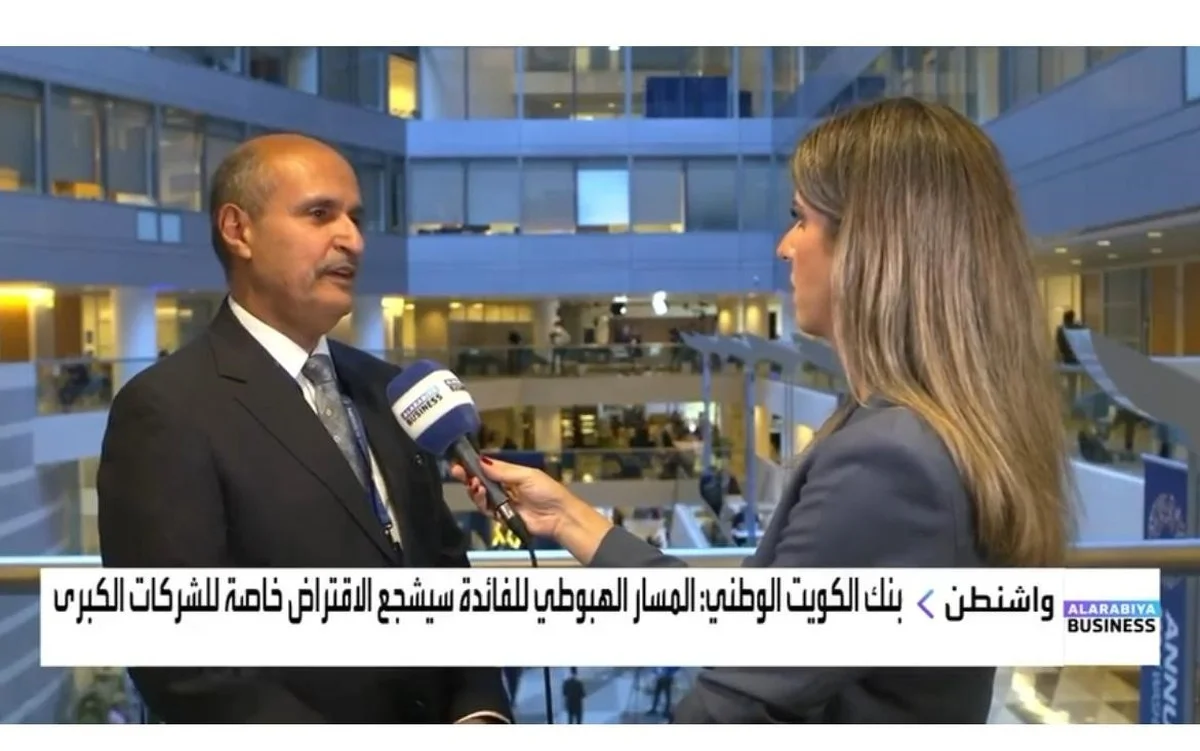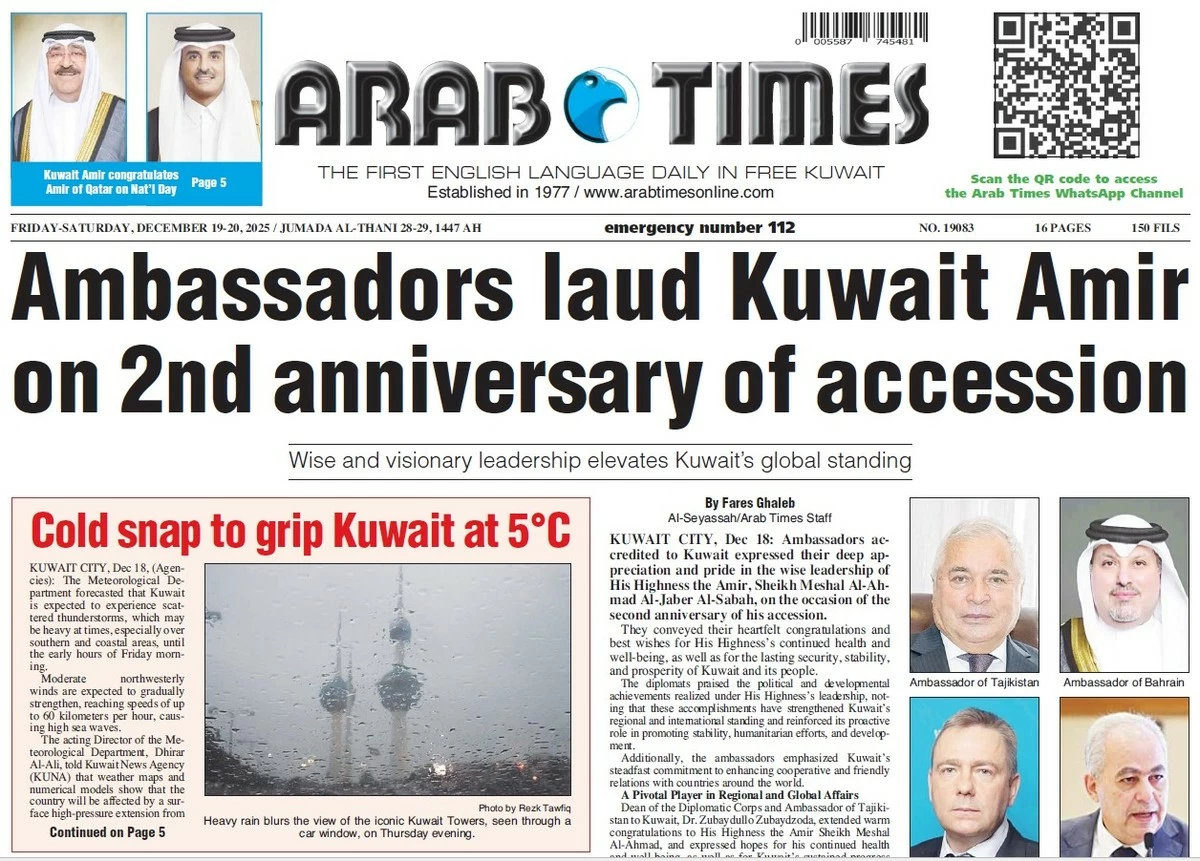26/10/2024
26/10/2024

KUWAIT CITY, October 26: Mr. Isam Al-Sager, Group Vice-Chairman and CEO of National Bank of Kuwait (NBK) stated that the Group’s net profit growth remains mainly driven by core banking business.
In his interview with Al Arabiya TV, on the sidelines of the Annual Meetings of the International Monetary Fund (IMF) and the World Bank Group (WBG) in Washington, D.C. joined by NBK, Al-Sager mentioned: “NBK posted strong net interest income growth for 9M2024 on the back of growth in volumes, relatively higher interest rates, and operating efficiently to control operating costs and cost of risk.”
“Our net interest income for the nine-months period reached KD 733.7 million, boosting by 10.2% over 2023, whereas net operating income reached KD 931.0million, growing by 7.8% year-on-year.”
“The cost of risk was 34bps during 9M2024, mainly resulting from lower credit loss and impairment provisions, while remaining committed to our conservative approach in managing credit exposures,” he noted.
“As regards asset quality, NPL ratio generally improved to reach 1.39% of total credit portfolio as at end of December 2024, whereas loan loss coverage ratio increased to 263%,” he added.
Lower interest rates
On the impact of the rate cut cycle on banks' net margins during 4Q2024 and next year, Al Sager said, “It is true that margins come under pressure with low interest rates, but we must keep in mind that the increased volume of business activities resulting from the low interest rate environment may offset these pressures, as the declining rates will encourage lending, especially by large corporates.”
“NBK is hedging against interest rate movements through its diversified business model and increased focus on fee business, and we expect net margins for 2024 to be largely stable, probably a few basis points higher than last year's levels,” he explained.
“As for 2025, the frequency and size of rate cuts globally remains uncertain, and its impact will be felt more clearly in the coming quarters,” he added.
On a question about the possibility of a change in demand for lending due to the declining lending cost, Al-Sager replied: “For corporate lending, lower interest rates are expected to support credit growth, but this is also conditional on a favorable macroeconomic and business environment and accelerated project awards, which combined will provide a greater momentum for private sector lending. On the retail side, we expect to see a gradual increase in demand for retail loans with each rate cut.”
Saudi Market
On NBK’s operations in Saudi Arabia, Al-Sager emphasized that Saudi Arabia as a key and strategic market for the Group’s international operations where we offer our services to diverse clientele that includes GREs, large corporations, and family-owned businesses.
“The Group seeks to increase its presence in the wealth management business through NBK Wealth, in addition to expanding its offerings to customers through funds and other wealth management services.
As regards NBK's targets and growth expectations in Saudi Arabia, Al-Sager said that they will be in line with the bank's conservative approach, noting that NBK has been present in the Saudi market for a long time and serves large corporations and GREs, which align with the Group’s conservative approach and risk management practices.”
“We operate currently in KSA through 3 branches, in Riyadh, Jeddah and Eastern Province and target further expansion in the Saudi market.”
On a question about whether NBK- KSA intends to expand in the Saudi market through acquisitions, Al-Sager said, “Whenever we have a suitable acquisition opportunity, we will consider it seriously. We are not looking for acquisitions for the sake of acquisitions, but we seek opportunities that maximize returns for our shareholders.”
Egyptian Market
As for the Egyptian market, Al-Sager said that it is currently stable, which proves NBK's optimism about the market's huge potential and promising opportunities.
“The Egyptian economy has recently benefited from the reforms aiming to attract more foreign inflows and the government's closing of several foreign investment deals, which restored confidence in the economy and the Egyptian currency,” he explained.
Regarding NBK-Egypt, Al-Sager stated, “We maintain a very healthy loan portfolio in terms of asset quality, while the cost of risk at the end of 1H2024 in Egypt was below 1% (0.56% exactly), and NPL to total loans ratio stood at 1%. So, at this stage, we are not concerned about the credit quality of our loan portfolio in Egypt.”
“Our operating performance in Egypt remains among the most profitable locations for the Group with promising returns, while NBK-Egypt seeks opportunities to grow its contribution to the Group, which stands at around 5% of total assets and profits,” he highlighted.
Boubyan and Gulf Bank Merger Negotiations
On the merger negotiations between Boubyan Bank and Gulf Bank, Al-Sager said, “As the majority shareholder in Boubyan Bank, we are supportive of the discussions. But our support is not unconditional, like all our previous transactions historically, we should find shareholder value creation in this transaction.”
“So far, the potential transaction makes sense from a strategic point of view as it is in line with NBK Group's diversification agenda and strengthens its position in the local market by expansion in Islamic banking through Boubyan Bank.”
“There are steps that have started recently such as the due diligence process, and there is a long list of regulatory and market requirements, and once these are completed, we will be able to reach a final assessment of the feasibility of the transaction,” he continued.
Project Awards
Al-Sager said he is optimistic about the business environment and the project award market in Kuwait, especially in light of the strong activity witnessed by the project market during the third quarter of this year compared to the recent past years, expecting this momentum to continue in the remainder of 2024 as well as into 2025.
He pointed out that the suspension of parliament had so far led to a simplification of the decision-making process, as the decision is now solely in the hands of the government. Therefore, we no longer have that entanglement of decision-making, which will reflect positively on the long-awaited economic reforms.
“Several projects were delayed for years and now we can say we are getting out of the bottleneck and Kuwait is on the right track to drive economic growth with a government-backed consensus to prioritize major development projects, and promote Kuwait as an attractive investment hub by passing a set of long-awaited key laws to support economic reforms. We remain optimistic to witness serious steps towards promoting the private sector’s role in propelling development,” he said.
“We think that our optimistic look about starting economic reforms and improving business environment in Kuwait in the coming period will be supported by actual steps on the ground,” he stressed.
Fiscal Reforms
On whether the fiscal reforms likely to be undertaken by the government, especially those related to current spending, will impact consumer spending and credit in Kuwait, Al-Sager said: “We need to look at the bigger picture as Kuwait needs reforms to support the transition to a dynamic and diversified economy, and to achieve that goal, there is a need for significant reforms to address fiscal imbalances on the public spending side.”
“Kuwait has been experiencing modest growth of the non-oil economy since the pandemic, which requires changes in the composition of public spending with an increased focus on capital investments, to bridge the performance gap with neighboring economies,” he explained.
Al-Sager expected that the impact, if any, of implementing current spending reforms on consumer credit would be temporary, and that the momentum would be quickly restored, as the consumer credit sector in Kuwait is strong, resilient, and highly dynamic.


